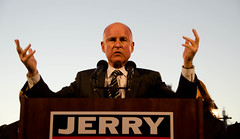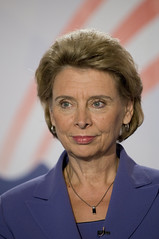We retired Tax Justice Blog in April 2017. For new content on issues related to tax justice, go to www.justtaxesblog.org
Note to Readers: Over the coming weeks, the Institute on Taxation and Economic Policy will highlight tax policy proposals that are gaining momentum in states across the country. This week, we’re taking a closer look at proposals which would increase state revenues to pay for important public investments.
Given the number of Governors calling for major tax cuts in their states, you’d think that states are suddenly awash in cash and well on the road to economic recovery. But the reality is that very few states are back to where they were before the recession hit in terms of tax collections and public spending. Many were limping along with federal stimulus funds, but now that’s dried up, too. Recognizing the need to begin restoring investments in education, transportation, and health care or prevent even more devastating cuts to these services, a handful of Governors have put tax increases on the table. The proposals range from across-the-board rate increases to tax hikes only on the wealthiest, permanent to temporary changes, and plans that require only legislative approval to ballot initiatives for the public to decide.
 California Governor Jerry Brown is taking his proposed tax increase to the voters in November. In an effort to prevent damaging cuts to public education, Brown is asking wealthy Californians to pay more income taxes and everyone to chip in with a higher sales tax for the next five years. A recent poll shows Californians are overwhelmingly on his side- more than 2/3rds of those surveyed support the Governor especially when the tax increases are linked to investments in education.
California Governor Jerry Brown is taking his proposed tax increase to the voters in November. In an effort to prevent damaging cuts to public education, Brown is asking wealthy Californians to pay more income taxes and everyone to chip in with a higher sales tax for the next five years. A recent poll shows Californians are overwhelmingly on his side- more than 2/3rds of those surveyed support the Governor especially when the tax increases are linked to investments in education.
Maryland Governor Martin O’Malley included several revenue raising measures in his recent budget proposal to help close a $940 million gap. Most notable is a plan to raise taxes on upper-income Marylanders through limiting the amount of itemized deductions and personal exemptions they are able to claim – a recommendation ITEP made last year.
O’Malley also proposed taxing internet transactions, digital downloads and increasing taxes on tobacco products and the state’s “flush tax.” He recently announced a plan to apply the sales tax to gasoline rather than an increase in the designated gas tax to address transportation needs in the state.
Washington lawmakers are facing off on how best to address a  $1 billion budget gap this year. Governor Christine Gregoire is pushing for a temporary half-cent sales tax increase that would raise roughly $500 million, and to close the remaining gap with spending cuts. At least two competing proposals, however, have emerged that would raise needed revenue and improve the fairness of the state’s tax structure. The first is a one percent tax on corporate and personal income that would raise $500 million and allow for a reduction in the state’s sales and business-occupations taxes. Another plan would tax realized capital gains at five percent, raising between $215 million and $650 million a year.
$1 billion budget gap this year. Governor Christine Gregoire is pushing for a temporary half-cent sales tax increase that would raise roughly $500 million, and to close the remaining gap with spending cuts. At least two competing proposals, however, have emerged that would raise needed revenue and improve the fairness of the state’s tax structure. The first is a one percent tax on corporate and personal income that would raise $500 million and allow for a reduction in the state’s sales and business-occupations taxes. Another plan would tax realized capital gains at five percent, raising between $215 million and $650 million a year.
Given Washington’s restrictive rules on revenue-raising (a two thirds legislative supermajority is required to enact increases), any proposed tax increase will likely end up on a ballot (which a legislative simple majority can implement) for the voters to decide this Spring or Fall.
North Carolina Governor Beverly Perdue recently proposed reinstating most of a temporary sales tax increase that expired last year. She wants to invest the $800 million the tax would raise in the state’s public schools, community colleges and universities, all of which suffered massive cuts over the past four years.
 Massachusetts Governor Deval Patrick is promoting some revenue raising ideas he says are supported by the public. His $230 million revenue package includes a 50 cent per pack increase in the cigarette tax (bringing the total to $3.01), increases on other tobacco products, expanding the bottle bill so that a wider range of beverages require a redeemable nickel deposit, and taxing candy and soda at the state’s 6.25 percent rate (both are currently exempt from taxation).
Massachusetts Governor Deval Patrick is promoting some revenue raising ideas he says are supported by the public. His $230 million revenue package includes a 50 cent per pack increase in the cigarette tax (bringing the total to $3.01), increases on other tobacco products, expanding the bottle bill so that a wider range of beverages require a redeemable nickel deposit, and taxing candy and soda at the state’s 6.25 percent rate (both are currently exempt from taxation).
Rhode Island After failing to gain legislative support last year for his reform-minded and sensible tax plan, Governor Lincoln Chafee has offered up a hodgepodge of tax changes this year he thinks lawmakers can stomach. Chafee’s$88 million tax package includes some modest expansion of the sales tax to items such as taxi and limousine rides and pet services.
Photo of Christine Gregoire via Studio 8, photo of Deval Patrick via Green Massachusetts, and photo Jerry Brown via Steve Rhodes Creative Commons Attribution License 2.0